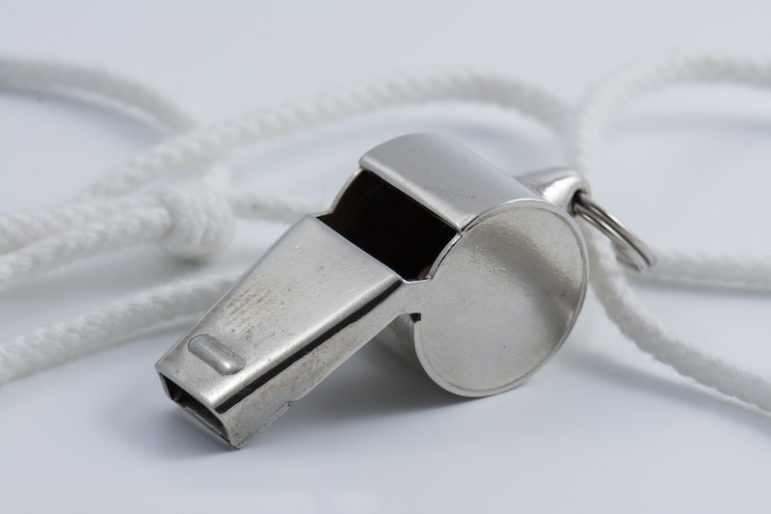
Photo: Shutterstock
More whistleblowers are likely to contact reporters in the years ahead, as new, secure communication channels open and greater legal protections roll out in Europe and other regions. The duty to protect them will remain as strong as ever, and there are now nonprofit resources available to help.
Several key considerations for reporters emerged from a panel at the Global Investigative Journalism Conference that included Anna Myers, executive director of Whistleblowing International Network; Julie Posetti, head of the New Journalism Innovation Project at the Reuters Institute; and Delphine Halgand, executive director of The Signals Network.
“Whistleblowing is not without risk, but we can help minimize the risk,” Halgand said.
A nonprofit operating in the United States and Europe, The Signals Network offers customized support to inside sources who have contributed to reports of significant wrongdoing. These can include safe houses, media relations, and legal, psychological, and financial support.
She said that The Signals Network was currently supporting around 10 whistleblowers in countries like the US, the UK, and Portugal. In the past, their supported sources have included people who exposed football corruption, medical devices scandals, and sexual assault.
Halgand, who is a former US director of Reporters Without Borders, said that the case of Jeffrey Sterling, the former CIA agent convicted under the Espionage Act for talking to New York Times journalist James Risen — and which was the case that launched The Signals Network — illustrated the profound loneliness faced by confidential sources.
Halgand said: “What struck me was that when Risen was facing prison, there were dozens of protests and events with all the big names. And then when Jeffrey Sterling was sentenced to jail, there was nobody. Nobody in the room; nobody to stand up for him. And yet he was sentenced to two years in jail only based on metadata; no proof whatsoever that he shared secrets.”
Tips from the Experts
Here a few tips gathered from the panel of experts:
1. Ensure that you have PGP encryption on your emails and texts, and make sure that you let the public know about it on your Twitter and social media accounts. Suggest that sources download the Signal secure messaging app. “You need to make it easy and secure for people to contact you,” said Halgand.
2. Seek online security training, even as a freelancer, and try to create a newsroom fund to support whistleblowers when things go wrong.
3. After a secure first contact, you should start by establishing whether there is a good story to pursue, and whether the information can be authenticated.
4. Where the whistleblower faces severe risk and requires anonymity, you should be prepared to turn them away if it is clear that they would be exposed following publication.
5. Don’t make promises to the source that you can’t keep, in terms of directly suggesting resources like safe houses. Instead, arm your source with online tutorials about safe, encrypted communication, and with online resources like The Signals Network, the Government Accountability Project, and Whistleblowers International Network.
6. Ask the person if they have legal advice. If not, tell them to talk to a dedicated nonprofit organization like The Signals Network. A professional there would then give the source the contact for a pro bono lawyer in their home country.
7. If they come back to you, check with the source to ensure that they understand all of the potential risks they could face: financial, psychological, reputational, and physical. Bear in mind that even family members of whistleblowers often struggle to understand why they take these risks.
8. If a professional NGO has taken the whistleblower’s case following a story’s publication and their welfare is no longer your core responsibility, then use the time saved to keep building on the story.
9. Remember that the supporting NGOs don’t deal with the confidential information disclosed, and have no role in the story itself. Rather, after initially linking the source with a pro-bono lawyer, the NGOs then stand back while the story is in progress, and step back in to provide fall-out support after the story in published.
10. For those in Europe, the new EU rules on whistleblower protections have been welcomed by advocacy groups as “a good start,” and are likely to generate more disclosures in the years to come. However, Halgand warned that the new law had not yet been enacted, and that the period prior to its final approval could represent a unique risk for sources. Reporters, she says, should therefore advise confidential sources to double-check the current rules in their home countries.
“In certain countries you have to do certain things to benefit from the legal protections,” she says. “For instance, if you’re in France, you have to first raise the alarm internally, or with a regulating authority, before you go to the press.”
 Rowan Philp was chief reporter for South Africa’s Sunday Times for a decade, a period book-ended by fellowships at the Washington Post and MIT. Rowan has reported from 27 countries, and his 2014 investigative report revealing Russia’s secret effort to sell 8 nuclear reactors to the South African government for some $70 billion was credited for a role in the scrapping of that deal last year. He is a regular contributor to GIJN.
Rowan Philp was chief reporter for South Africa’s Sunday Times for a decade, a period book-ended by fellowships at the Washington Post and MIT. Rowan has reported from 27 countries, and his 2014 investigative report revealing Russia’s secret effort to sell 8 nuclear reactors to the South African government for some $70 billion was credited for a role in the scrapping of that deal last year. He is a regular contributor to GIJN.
